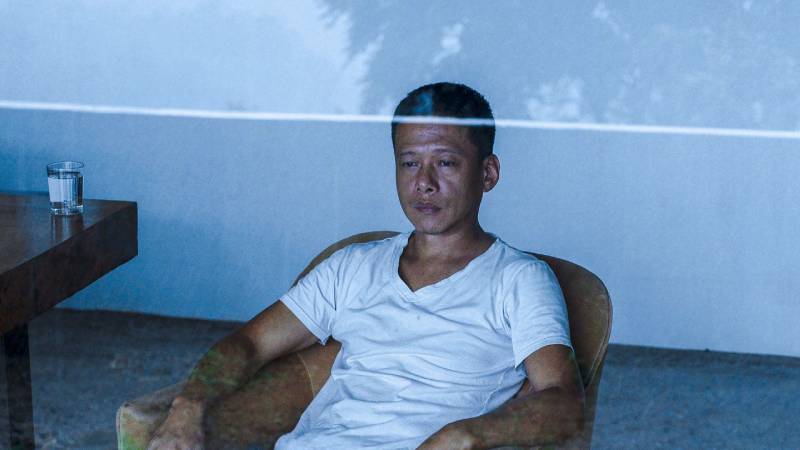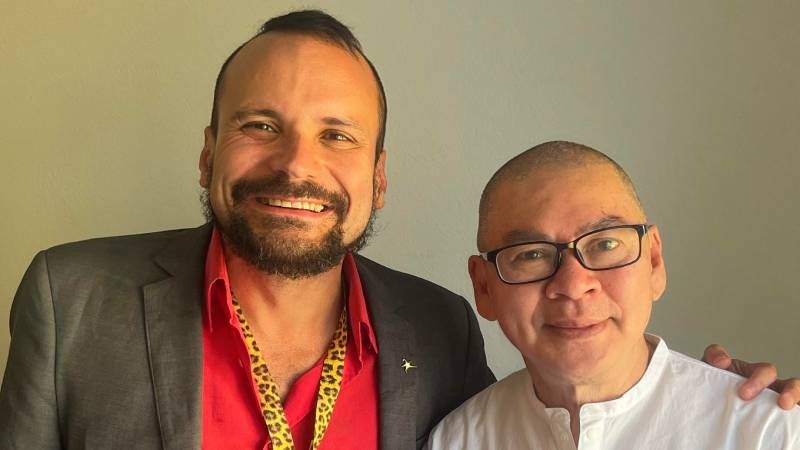




Having been a huge fan of the 65-year-old director – perhaps the most prominent LGBT+ filmmaker in Asia and certainly one of the biggest exponents of slow cinema in the world -, I couldn’t wait to meet Tsai Ming-liang in person. I first watched The River (1997) when I was still a teenager in my native Brazil while working at the Sao Paulo Film Festival, in the year then film was originally launched. Ming-liang’s tender and subversive sensibility shocked and moved me profoundly. He has firmly remained on my radar since.
He attended the 76th edition of the Locarno Film Festival. On August 3rd, he received the Career Leopard Award in a nearly packed Piazza Grande (which can host a whopping 8,000 film-lovers). Giona A. Nazzaro, the Festival’s Artistic Director explains: “The cinema of Tsai Ming-liang entails a passionate convergence of stories and languages. From the outset he has been able to capture the multiple identities of a creative pathway through the complex articulations of both Taiwanese history and his personal story as a Chinese moving between Malaysia and Taiwan”.
The art exhibition entitled Moving Portraits was also held in Locarno. Its included experimental audiovisual works such as exhibition Transformation (2012), Your Face (2018) and The Tree (2021), curated byKevin B. Lee. His experimental pieces, much like his feature films, are very slow-paced and require a lot of love – and hours – in order to be appreciated in their full splendour.
Ming-liang was born in Malaysia to Taiwanese parents, and he moved to Taipei at the age of 10, where he still resides. He has a career spanning more than three decades, and 11 feature films. He won many prestigious prizes around the world, including the Golden Lion at the Venice Film Festival for Vive L’Amour (1994). The remained particularly active in the 1990s and 2000s, when he became widely recognised for the topics of unfulfilled sexuality, loneliness, alienation and the passage of time. His films have since became more sparse, with most of his recent output dedicated to exhibitions. He only made one feature film in the ’10s, the tragic and gloomy Stray Dogs (2013). His last film Days was released three years ago.

The director does not speak any English, and our brief interview was aided by a sharp interpreter, courtesy of the Festival. We started our conversation discussing realism. “My films come from life, real life. That’s why I show a lot of loneliness. The characters show their personality through behaviour, not words. I really care about authenticity, that’s one of my biggest pursuits. I want audiences to feel this authenticity. That’s why I don’t leave much room for performance. In general, ordinary actors are afraid of not being able to perform. On the other hand, non-professional actors don’t know how to perform, and instead just do what they are asked to do. Even with non-professionals, I don’t give many instructions. I just put them in certain space and environments, and their own actions or behaviours will take care of the rest. And sometimes these reactions are completely unexpected”.
Ming-liang has consistently used a combination of professional and non-professional actors in his films, and he has a very close relationship with them, particularly 54-year-old Lee Kang-sheng, who has starred in every single one of his 11 feature films. “I live very close to my actors, physically and figuratively. Lee Kang-sheng lives in the same neighbourhood as me. So I observe him, I often watch his life”. He then explains that his closeness enables him to observe the passage of time more effectively, and that he intends to do a film about ageing. “I want to shoot a movie about myself at the age of 60. Because that’s when I realised my body is going through a lot of changes. But I want Kang-sheng to play that role, so I am waiting for him to turn 60”. The passing of time is a recurring topic in many of Ming-liang’s movies (such as 2001’s What Time is It There and Days), and also in his filmography as a whole (as the director observes Kang-sheng’s real-life ageing).
We also talked about the importance of sounds, and their purpose on the elusive search for authenticity: “My films are full of sounds. These are sounds of everyday life, reality replaces the music score. Sometimes these sounds are exaggerated. The objective is to highlight the inner loneliness of the characters. [We hear these sounds] as if they were close to their ears”. I asked him why I asked why Days is “intentionally unsubtitled” (as announced in the beginning of the film). “I don’t really believe in film dialogues. They are not real. That’s just too dramatic”, he explains in his soft and calm voice.

Next, we talked about equality rights. His face lit up, and the director became visibly proud when I asked him about Taiwan being the first country in Asia to legalise gay marriage (in May 2019), and whether he thought that his art played a role in changing the nation’s hearts. He gives a prompt and confident answer: “Yes, I think that my films contributed to same-sex marriage. I really appreciate these changes in Taiwan. I arrived in Taiwan 30 years ago, and I met a local activist who was campaigning for gay rights with placards on the streets back then, and he is still doing that. I want to ask you a question. How many different types of people do you think God created? Just men and women? Gays don’t decide they become gay, right? Flowers can be green, yellow or red. In Taiwan the young generation can really be themselves. I’m glad to live in such a place”.
We finished our interview by talking about another topic close to Ming-liang’s heart (and other parts of his anatomy). I asked him: “Is it ok if we talk about sex?”. He promptly replied “yes”, in English and before the question was translated, with a big smile on his face. I carried on: “Sex in your films is very beautiful, but also very subversive. You get a huge age gap [Days], incest (The River], prostitution [What Time is It There?, Days] and even watermelons [The Wayward Cloud, 2005]. Is subversive sex more beautiful than traditional sex?”. He retorted: “I like sex a lot. But I’m old now! The sex that you see in my movies is actually beautified. Sex in real life is like eating, or other human relations. The more authentic part of sex isn’t so beautiful, not so perfect. When audiences look at sex in my films, they don’t just see sex, they also see dominance, the inability of communicate and loneliness. In Days, for example, you cannot deny that sex was transactional, yet you cannot deny it brought consolation to a lonely person”.
Let’s hope that Tsai Ming-liang’s future projects come to fruition, that there is no shortage of sex – beautified or not -, and that we can continue to observe the passing of time in the life of the artist and his favourite actor Kang-sheng.
.
,,,
Tsai Ming Liang is pictured at the top and at the bottom of this article (alongside Victor Fraga), snapped by Victor Fraga. The image at the middle is a still from Days.
















